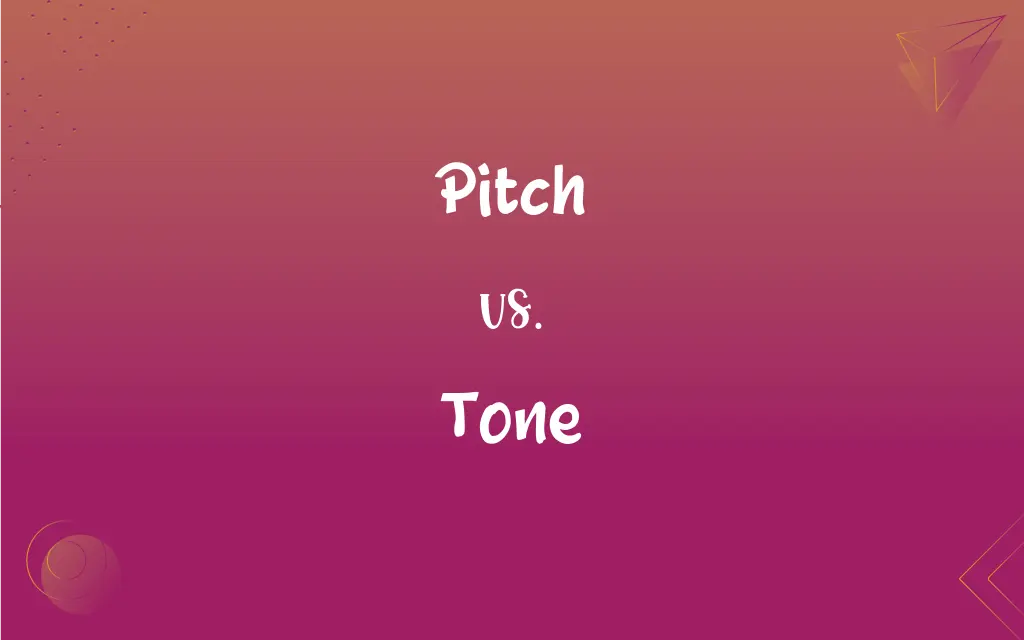Pitch vs. Tone: What's the Difference?
Edited by Janet White || By Harlon Moss || Updated on October 24, 2023
Pitch refers to the perceived frequency of a sound, high or low, while tone is the quality or character of a sound, often influenced by its timbre and harmonics.

Key Differences
Pitch primarily deals with how high or low we perceive a sound to be, dependent on its frequency. Tone, on the other hand, concerns itself with the distinct sound quality or character that differentiates one source or type of sound from another.
An instrument or voice can produce various pitches, from high to low notes. However, the tone is what makes a violin sound different from a trumpet, even when they play the same pitch.
While pitch can be measured precisely in terms of frequency, tone is a more subjective quality, often described using words like "warm", "bright", or "mellow". Both pitch and tone are integral in distinguishing and recognizing different sounds.
In musical terms, pitch helps us identify notes and their relations, like melodies and harmonies. Tone, conversely, assists in recognizing instruments, voices, or the emotional quality of music.
Understanding both pitch and tone is crucial for musicians. While pitch ensures they are in tune with others, tone allows for expression, color, and a unique sound signature.
ADVERTISEMENT
Comparison Chart
Definition
Perceived frequency of a sound.
Quality or character of a sound.
Measurement
Can be measured in Hertz (Hz).
More subjective, described by adjectives.
Musical Application
Helps identify notes and their relations.
Differentiates instruments or voices.
Perception
How high or low a sound is.
What makes a sound source recognizable.
Relation to Sound
Fundamental aspect of sound.
Influenced by timbre and harmonics.
ADVERTISEMENT
Pitch and Tone Definitions
Pitch
Pitch is the perceived frequency of a sound.
The pitch of a whistle is usually high.
Tone
Tone can convey emotions in music.
The somber tone of the piece evoked feelings of sadness.
Pitch
Pitch is integral to melodies in music.
The song had a varying pitch, moving from low to high.
Tone
Tone differentiates sound sources.
Each singer's voice had a different tone, making them identifiable.
Pitch
Pitch helps in tuning instruments.
She adjusted the pitch of her violin to match the piano.
Tone
Tone refers to the character or quality of a sound.
The tone of the cello was deep and resonant.
Pitch
Pitch can be determined by the rate of vibrations.
Tightening a guitar string increases its pitch.
Tone
Tone can describe the timbre of an instrument.
The saxophone has a unique tone, distinct from a flute.
Pitch
Pitch differences lead to musical intervals.
The difference in pitch between two notes created a harmony.
Tone
Tone can be influenced by technique and equipment.
The guitarist used a pedal to change the tone of his guitar.
Pitch
Any of various thick, dark, sticky substances obtained from the distillation residue of coal tar, wood tar, or petroleum and used for waterproofing, roofing, caulking, and paving.
Tone
A sound of distinct pitch, quality, and duration; a note.
FAQs
How is pitch measured?
Pitch is measured in terms of frequency, typically in Hertz (Hz).
How is tone different from pitch?
Tone refers to the quality or character of a sound, differentiating one sound source from another.
What does pitch refer to in music?
Pitch refers to how high or low a sound is perceived, based on its frequency.
Can tone be measured similarly to pitch?
No, tone is more subjective and is often described using adjectives rather than exact measurements.
Does pitch directly influence tone?
While pitch can be part of a sound's character, tone encompasses more elements, like timbre and harmonics.
Can two instruments have the same pitch but different tones?
Yes, a piano and violin can play the same pitch, but they'll have distinct tones.
Why is pitch important in music?
Pitch helps define melodies, harmonies, and ensures musical coherence and tuning.
Are high-pitched sounds always loud?
No, pitch and loudness are distinct; a sound can be high-pitched yet quiet.
What affects the tone of a musical instrument?
Factors like material, construction, technique, and equipment can influence an instrument's tone.
How can a musician alter the tone of an instrument?
Techniques, adjustments, and equipment (like pedals) can help modify an instrument's tone.
Are pitch and tone only relevant in music?
No, pitch and tone are essential in various audio applications, from speech to sound design.
Do animals perceive pitch and tone like humans?
While animals can perceive sound, their sensitivity and interpretation of pitch and tone may differ from humans.
Why is tone significant for musicians?
Tone allows musicians to express emotion, achieve a unique sound, and differentiate instruments.
Can the pitch of a note be changed without affecting its tone?
Not entirely. Changing the pitch might influence some aspects of the tone, especially in vocal sounds.
Can two people have the same speaking pitch but different tones?
Yes, two individuals might speak at a similar pitch but have distinct tonal qualities in their voices.
Can the tone of an instrument change over time?
Yes, wear, aging, and changes in construction materials can alter an instrument's tone.
Can the human voice vary in pitch and tone?
Yes, voices can vary in pitch (soprano to bass) and have unique tones (nasal, breathy).
Do all instruments have a fixed pitch?
No, some instruments, like drums, may not have a definite pitch but still possess a distinct tone.
How do singers control their pitch?
Singers adjust pitch by controlling their vocal cords' tension and length.
Is tone the same as timbre?
Not exactly. While related, timbre is a component of tone, describing the color or shade of a sound.
About Author
Written by
Harlon MossHarlon is a seasoned quality moderator and accomplished content writer for Difference Wiki. An alumnus of the prestigious University of California, he earned his degree in Computer Science. Leveraging his academic background, Harlon brings a meticulous and informed perspective to his work, ensuring content accuracy and excellence.
Edited by
Janet WhiteJanet White has been an esteemed writer and blogger for Difference Wiki. Holding a Master's degree in Science and Medical Journalism from the prestigious Boston University, she has consistently demonstrated her expertise and passion for her field. When she's not immersed in her work, Janet relishes her time exercising, delving into a good book, and cherishing moments with friends and family.































































